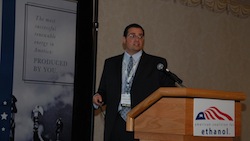Congress is preparing to return to work and there are two issues top of mind: The FAARM Bill and the Renewable Fuel Standard (RFS). During the break the Renewable Fuels Association (RFA) took a look at some of the Big Oil’s summer arguments against ethanol and created a narrative around why these are not valid.
 “While Congress has been away, much has happened to set the record straight on ethanol,” explained Bob Dinneen, RFA’s President and CEO. “Rising gas prices have made the value proposition of ethanol compelling for consumers. Indeed, drivers turned out in large numbers over the summer to purchase record volumes of low cost, renewable E85. Academics and government officials spoke out on successfully scaling the blend wall.”
“While Congress has been away, much has happened to set the record straight on ethanol,” explained Bob Dinneen, RFA’s President and CEO. “Rising gas prices have made the value proposition of ethanol compelling for consumers. Indeed, drivers turned out in large numbers over the summer to purchase record volumes of low cost, renewable E85. Academics and government officials spoke out on successfully scaling the blend wall.”
Dinneen also noted that the growing potential for a bin-busting harvest has undermined the food vs. fuel canard, and USDA’s data has proven food inflation is not being driven by ethanol and the RFS. “Slowly, but surely, Big Oil’s heavy handed scare tactics are eroding under the weight of honest data and consumer demand,” he said.
“By the way, in case you missed it, Summer 2013’s “Best Beach Read” award goes to the API/AFPM for their 2014 RFS waiver request,” continued Dinneen. “It has everything, except legal standing, that a fun breezy summer novel should have — futuristic fiction, scary twists and turns, and even a romance with monopolies. In return, RFA penned a compelling and critical review of the API/AFPM tome, laying bare the lack of legal and technical support for a waiver,” concluded Dinneen.
To read in full RFA’s review of the American Petroleum Institute (API)/American Fuel and Petrochemical Manufacturers (AFPM) 2014 partial-waiver request click here.
RFA has released a brief “Big Oil’s Fiction vs. Fact” Below are a few of these issues that Big Oil has raised and the ethanol industry has defended.Read More









